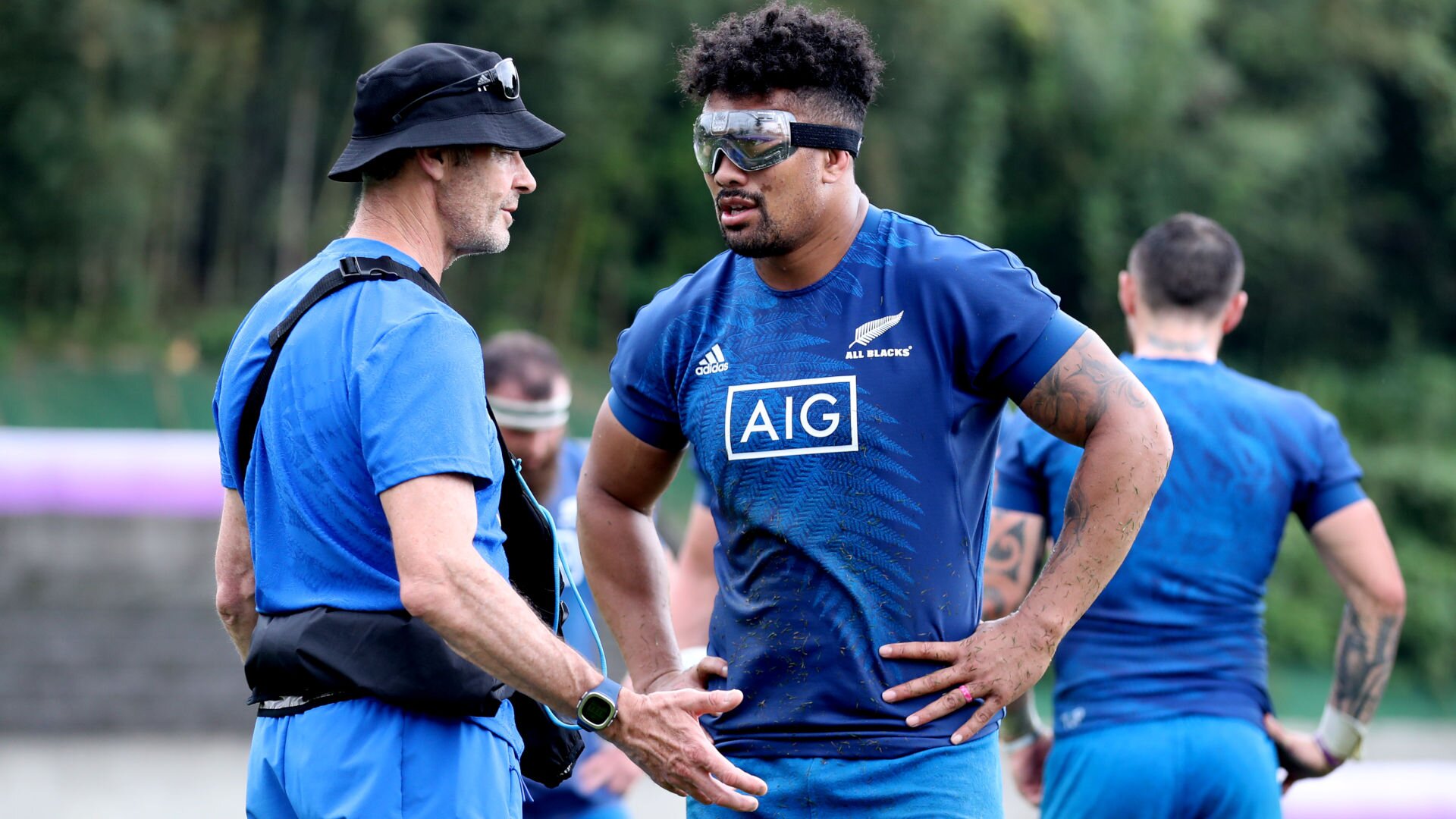'When a player comes and says his eye's getting worse, don't you think it's the right thing?'
New Zealand assistant coach Ian Foster has explained the decision to start Ardie Savea with protective goggles in their World Cup Pool encounter with Canada this week.
Savea will make Rugby World Cup history on Wednesday when he wears goggles in the All Blacks’ clash with the North Americans.
The New Zealand flanker’s move comes after he discovered that vision had deteriorated in his left eye, and he needed protection.
He will follow Italy international Ian McKinley, who was the first Test player to wear the specially-designed rugby goggles.
“He’s had a lack of vision in one eye for a while and he just feels this is the right time to protect the other one,” Foster told reporters.
“It’s purely for protection. I don’t know too much about them except they’re World Rugby-approved goggles and that some other players have worn them. For me, it’s the right move for Ardie and it’s great that it helps protect an area that other people have an issue with and it’s a great message.”
When queried about the timing of the goggles, Foster replied: “When a player comes and says his eye’s getting worse, don’t you think it’s the right thing to do for the player? I think it’s a very natural time.”
The All Blacks coach maintains that the medical staff are keeping a close eye on the flanker’s eyesight.
Ardie Savea will follow in the footsteps of Italian star Ian McKinley by wearing rugby goggles in the @AllBlacks next @rugbyworldcup clash against Canada tomorrow. #RWC19 #NZLvCAN https://t.co/PGQNSrnEHH
— RugbyPass (@RugbyPass) September 30, 2019
“It’s not a concern from us from a point of view that we’re not surprised. He’s been dealing with it for a few years. We’ve got a great medical staff so we trust all the research they’ve done and they’ve come up with this conclusion.
“Ardie has now trialled (the goggles) and it was a great week to trial it. We’ve trained pretty physically: it’s been hot, humid and we had a day when we were attacked by dragonflies in training, but he’s come through that really good. He feels really confident so as far as we are concerned, this is just a standard safety issue.”
New Zealand playmaker Beauden Barrett also weighed in on the topic: “It sort of makes sense now. I’d never thought of it until this point, but there were certain trainings and games when he’s blinking a bit more than usual.
“I remember scenarios where it now makes sense.”
In a statement released by the NZR, Savea said issue was not a new one.
“A couple of years ago I realised I had bad vision in my left eye. Everything is kind of blurry,” Savea said, in a statement released by the All Blacks.
“I told All Blacks doctor Tony Page that it was getting worse, and now we are doing something about it.
“He notified me that World Rugby had some goggles that were approved, and everyone has been really supportive.
RugbyPass Exceptional Stories ??
The inspirational story of Ian McKinley's journey back into professional rugby, after losing complete vision in his left eye.
Narrated by Jim Hamilton. https://t.co/TfJZ4BXwdO
— RugbyPass (@RugbyPass) December 13, 2018
“In terms of vision and seeing, it’s pretty sweet, and it’s now just a matter of getting used to them.
“I’ve got my little girl and hopefully future kids and a bigger family, so I want to be able to see. I’m just thinking of the bigger picture and trying to protect my eyes.”
World Rugby approved use of the goggles at all levels of rugby earlier this year, allowing those who are visually-impaired to play the game. Approval followed extensive development and trialling of the eye-wear.
Dr Page said that 25-year-old flanker Savea, who has won 40 caps, had worn the goggles at training this week and they had not affected his ability to play the game at the highest level.
“It’s probably been the most challenging conditions that you can get (to test them) – humidity at up to 90 per cent, 20 degrees (Celsius in temperature) or so, and hard All Blacks training, and he’s done pretty well,” Dr Page said.
New Zealand play Canada in Oita on Wednesday.
Additional reporting PA/World Rugby News Service
Press conference with Scotland head coach Gregor Townsend and captain Stuart McInally after their 34-0 win over Samoa in the Rugby World Cup group stage.
























































































